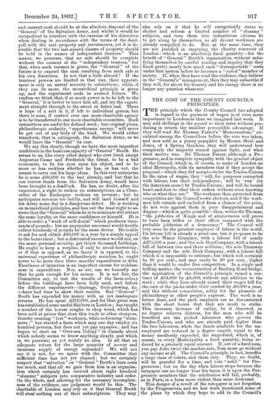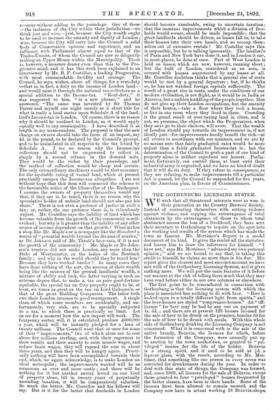THE COST OF THE COUNTY COUNCIL'S PRINCIPLES.
THE principle which the County Council has adopted in regard to the payment of wages is of even more importance to Londoners than we imagined last week. It may add shillings in the pound to their rates without pro- ducing in return the smallest perceptible advantage. If they will read Sir Thomas Farrer's "Memorandum," cir- culated among the Councillors before the vote was taken, and now sold as a penny pamphlet by Messrs. Steel and Jones, of 4 Spring Gardens, they will understand how completely the majority sinned against light, and what their motive was. Sir Thomas Farrer, although a Pre- gressive, and in complete sympathy with the general object of the Council, which is, of course, to make of London an ideal Metropolis, tells its members that if they accept the proposal—which they did accept—to let the Trades-Unions fix the rates of wages, they " will, for purposes connected with labour, lose their independence ; will be ' run ' (in the American sense) by Trades-Unions ; and will be bound hand-and-foot to obey their orders without even knowing who or what they are." The workmen thus protected from competition are the Council's own electors, and if the work- men left outside and excluded from a chance of the prize, do not vote against them in pure disappointment and disgust—which is quite possible—then, writes Sir Thomas, "the jobberies of Kings aud of aristocracies will prove to have been trifles in their effect compared with the probable jobberies of a democracy." The Council will very soon be the greatest employer of labour in the world. Its labour bill is already a great one, but it proposes to be the sole Water Company, with a labour bill of nearly £275,000 a year; and the sole Gas Company, with a labour bill of between two and thiee millions ; the sole Tramway Company and the sole Dock Company, with a labour bill which it is impossible to estimate, but which will certainly be 10 per cent., and may easily be 20 per cent., higher than it would be under free competition. In a single and trifling matter, the reconstruction of Barking Road bridge, the application of the Council's principle raised a con- tract of £54,000 by £6,000, without any addition to the work ; while they have already raised their wages bill for the care of the parks under their control by £6,000 a year, and this without compulsion, solely for the pleasure of philanthropy at other people's expense. The work is no better done, and the park employs are so discontented with the short hours that they are ready to strike. This immense increase of outlay, be it observed, in no degree relieves distress, for the men who will be benefited are the picked labourers who govern the Trades-Unions, and who are already paid higher than the free labourers, while the funds available for the un- employed are reduced in a degree exactly equal to the money needlessly expended, the wage-fund, which is, of course, in every Municipality a fixed quantity, being re- duced by a precisely equal amount. If, out of a fixed sum, you pay John twice the market-rate, Tom must go without any income at all. The Council's principle, in fact, benefits a large class of voters, and them only. They, no doubt, will be grateful for a time, and vote " solid " for Pro- gressives; but on the day when labour stops because the ratepayer can no longer bear his taxes, it is upon the Pro.. gressive members that the retribution will fall, probably, as in Paris, in a form more violent than mere dismissal. This danger of a revolt of the ratepayer is not forgotten by the Progressives, and we last week mentioned some of the plans by which they hope to add to the Council's revenue without adding to the poundage. One of these —the inclusion of the City within their jurisdiction—we think just and wise,—just, because the City wealth ought to be used to increase the amenity and dignity of London; wise, because the City will carry into the Council a solid body of Conservative opinion and experience, and an influence with Parliament almost equal to that of the Trades-Unions, of whom the Council are now so diligently making an Upper House within the Municipality. There is, however, a measure dearer even than this to the Pro- gressive mind, and it has this week been explained to an interviewer by Mr. B. F. Costelloe, a leading Progressive, with most commendable lucidity and courage. The Council, he says, wishes, above all things, for a rent-duty —that is, in fact, a duty on the income of London land— and would raise it through the national tax-collectors as a special addition to the Income-tax. "Rent-duty," it was suggested to him, "is a new phrase," and he answered, "The name was invented by Sir Thomas Farrer and myself one night merely as a short title for what is really a local surtax upon Schedule A of the land- lord's Income-tax in London. Of course, there is no reason why it should be confined to London, as it would apply equally well to any municipality. I have described it at length in my memorandum. The proposal is that the new charge on owners should take the form of an impost, say 4d. in the pound, to be declared by the Council's precept, and to be assimilated in all respects to the tax levied by Schedule A. I see no reason why the Income-tax collectors should not be empowered to collect it, simply by a second column in the demand note. They would be the richer by their poundage, and the method of collection would be cheap and certain. The only extraordinary machinery would be that necessary for the equitable rating of vacant land, which at present practically escapes the Income-tax altogether. I am not without hope that this item will commend the scheme to the favourable notice of the Chancellor of the Exchequer. I assume the owners of property themselves would say that, if they are to be taxed, there is no reason why the speculative holder of unbuilt land should not also pay his share." There is not even a pretence of justice in such a tax ; or, rather, the one pretence there is, is ridiculously unjust. Mr. Costelloe says the liability of land which has become valuable from the growth of the community is self- evident; but why is it greater than the liability of any other source of income dependent on that growth ? What makes a shop like Mr. Maple's or a newspaper like the Standard a source of "potential wealth beyond the dreams of avarice," as Dr. Johnson said of Mr. Thrale's beer-vats, if it is not the growth of the community ? Mr. Maple or Mr John- son's trustees did not make London, any more than the Duke of Westminster, or the ladies of the Bentinck family ; and why in the world should they be taxed less ? Because they have worked harder ? In many cases they have done nothing of the sort, the sources of their wealth being like the sources of the ground landlords' wealth, a mixture of ability and luck, the latter varying in such an extreme degree that, to make a tax on pure good-fortune equitable, the special tax on City property ought to be, at least, six times as great as the tax on Lord Cadogan's, or that of the great Building Companies. The latter both owe their London incomes to good management. A single class, of which some members are accidentally, and un- fortunately, very rich, are to be specially subjected to a tax, to which there is practically no limit. Let us see for a moment how the new impost will work. The fourpenny surtax will, it is calculated, produce .t600,000 a year, which will be instantly pledged for a loan of twenty millions. The Council want that at once for some of their" improvements," two of which alone are to cost above five millions sterling, and, with their eagerness to show results and their anxiety to raise muscle wages, and reduce brain wages, they will expend the sum in about three years, and then they will be hungry again. Practi- cally nothing will have been accomplished towards their end, which, we again acknowledge, is to make London an ideal metropolis ; the improvements wanted will be as numerous as ever and more costly ; and there will be nothing for it but another surtax levied on one kind of property alone, till in twenty years of perpetually ascending taxation, it will be comparatively valueless. So much the better, Mr. Costelloe and his fellows will say. But is it for the better that freeholds in London should become unsaleable, owing to uncertain taxation; that the immense improvements which a division of free- holds would secure, should be made impossible ; that the great landlords should be driven, as leases fall in, to take their houses into their own hands, and so recoup them- selves out of excessive rentals ? Mr. Costelloe says this is impossible, but he is talking ignorantly. The landlores of Paris and New York have done it, and in London it car, in most places, be done at once. Part of West London is held on leases, which are now, however, running short ; but the bulk of London, considered as an area, is covered with houses unprotected by any leases at all. Mr. Costelloe doubtless thinks that a general rise of rents would be met by a general departure ; but, if he thinks so, he has not watched foreign capitals sufficiently. The result of a great rise in rents, under the conditions of our modern civilisation, is not flight, as it would be in India or America, but a sudden huddling of the people together. Men do not give up their London occupations, but the amenity of their homes,—take a floor where they took a house, or live in one room where they lived in three. Crowding is the grand result of over-taxing land in cities, and is not, we presume, the object which the Progressives, when they next go to their electors, will avow. That the wealth of London should pay towards its improvement is, if not ideally just—for improvements hardly benefit the rich—at all events in accordance with our manners, and we are by no means sure that fairly graduated rates would be more unjust than a fairly graduated Income-tax is; but the determination of the Council to grab a part of one kind of property alone is neither expedient nor honest. Parlia- ment, fortunately, can control them, at least until their industrial army is organised, and we have no kind of doubt that it will do its duty. If they refuse in consequence, as they are refusing, to make improvements till a particular Act is passed, let the Council be suspended for five years, on the American plan, in favour of Commissioners.



































 Previous page
Previous page